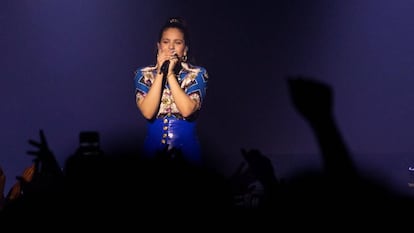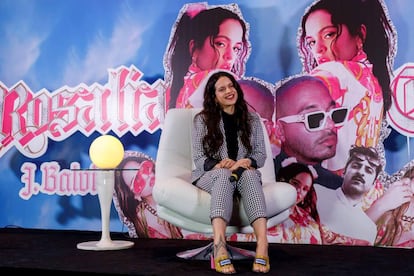The meteoric rise of Spanish star Rosalía
Six months after the release of the album ‘El mal querer,’ the Barcelona flamenco sensation is gracing the covers of US celebrity magazines and hanging out with Alicia Keys


She seems to have come out of nowhere to reignite the flamenco flame and set the global music scene alight. But her music goes beyond flamenco, fusing pop, R&B and electronica and cante onda, a type of flamenco vocal style from Andalusia.
Rosalía Vila has mixed it all together and shown it to the world. But while it may seem she has been catapulted from zero to international acclaim, hers is not an overnight success story, but rather the fruit of years of determination, measured decisions, sacrifice and hard work.
While it may seem she has been catapulted from zero to international acclaim, hers is not an overnight success story
Now 25, Rosalía was born in Sant Esteve Sesrovires, Barcelona, into a family with little musical talent, though her maternal grandmother, also called Rosalía, liked to sing. Skip a generation and the next Rosalía teamed the singing with determination. According to her family, she was always a restless child, full of energy and plans. Far from bashful, she would jump up and perform at the drop of a hat and was the heart and soul of her class at school. She spoke Catalan at home, except when she was playing with her sister Pili at pretending to be other people.
She was seven when she first moved her family to tears with her voice. The occasion was a family lunch and she was encouraged to get up and sing by her father. Everyone there ended up choked up. “I didn’t understand what had happened,” Rosalía told EL PAÍS. “But I knew that I could do something in music.” From that moment on, she began to channel all her energies into a career as a musician.

Rosalía likes to tell the story of how she discovered flamenco when listening to music in the park after school with her friends. They would do this everyday, but one afternoon, someone put on Spanish flamenco singer Camarón de la Isla and she was bewitched. She was so impressed by his voice that she wanted to learn more about him. And little by little, she began exploring the legends of flamenco.
The first time she got up on stage, she was just 13. “For a long time, no one paid me any attention. I have sung in restaurants, weddings and bars without any amplification,” she says, adding that the amount she earned for her efforts was often hardly enough to cover the cost of the parking lot. At 15, when she was studying in high school, she went on the TV talent show Tú Si Que Vales and got through to the semi-finals. And when the presenter Ángel Llácer criticized her for being out of tune, she shot back: “I can’t do everything. I have tried to act, sing and dance. I have tried my hardest, really.”
Finding songs that matched her voice and at the same time were songs she liked was one of the main obstacles
Music teacher José Miguel Vizcaya
By the age of 17, Rosalía had pushed her voice to its limit and had to undergo surgery on her vocal chords. Once she recovered, she signed up to study at the Catalonia College of Music (ESMUC).
“I studied what she’d done and saw she had a lot of work ahead of her,” says José Miguel Vizcaya – aka Chiqui de La Línea – who was her teacher at ESMUC. “She wasn’t used to listening to flamenco. She had heard the odd thing, but not much more than that. So it was a pretty big challenge. At first she did jazz gigs on her own and other types of music. She didn’t pay much attention to the guidelines of my classes but she was very keen to learn.”
Vizcaya also recalls one of the first challenges for the artist. “Finding songs that matched her voice and at the same time were songs she liked was one of the main obstacles,” he says. “But in the end the classes I had with her were a pleasure. She wasn’t hard work at all – she went the extra mile. Every week, she came to me with songs that were perfect.”
Rosalía graduated with distinction and was asked to perform at the graduation ceremony. But there was one thing her teacher regrets and that is not being able to record with her. “It was an idea that we had had from the start. But I was off work for almost a year and she was getting on with her own projects without me. So she slipped through my hands,” he says.
Rosalía chose to work with producer Raúl Refree on her first album, Los Ángeles, which came out in 2017. It caused a stir, but a small one, perhaps because the formula – singing seated and accompanied by a single guitar – was not right for her. But better projects were to come, such as the music video Antes de Morirme, which she recorded with her former partner, rapper C. Tangana. It was a route that Rosalía started to pursue after the release of Los Ángeles. She worked with producer El Guincho on her new album and together they created El mal querer, with Sony Music.
The track “Malamente” on El Mal Querer shot her to international stardom and the rest of the album, which was advertised on a massive screen in Times Square in New York, reinforced her status as a talent to be reckoned with.
Six months have passed since its release and she now adorns front covers of celebrity magazines in the United States and Canada, which refer in some length to her performances at the Latin Grammy awards, the Coachella festival in California and a recent concert in New York’s Webster Hall, which she took by storm.
Naturally, her rise has brought with it lifestyle changes such as a new circle of friends. If she previously rubbed shoulders with the likes of Alejandro Sanz, Pablo Alborán, Palomo Spain and Oscar-winning director Pedro Almodóvar, who cast her in his 2019 movie Pain and Glory, she now counts Dua Lipa among her fans, gives Spanish classes to Alicia Keys and has collaborated with Colombian reggaeton singer J. Balvin. And if that wasn’t enough to cement her status as the hottest star on the Latin circuit, she also featured in one of Kim Kardashian’s Instagram stories.
Family support
Rosalía’s mother and sister, Pili, have provided her with the hardcore support needed for her upward trajectory, with Pili largely responsible for her “bad-girl” look. “I am a very family-oriented person,” she says. “And I feel they are always very honest with me. They are always there whatever crazy things I want to get into.”
And while she does not mention her father much, she does say that both her parents have learned to appreciate what can be achieved with effort and determination.
It has been a long road, however, and when she was first getting established, she used her bedroom as her office. It looks as though she has now put those days firmly behind her.
English version by Heather Galloway.
Tu suscripción se está usando en otro dispositivo
¿Quieres añadir otro usuario a tu suscripción?
Si continúas leyendo en este dispositivo, no se podrá leer en el otro.
FlechaTu suscripción se está usando en otro dispositivo y solo puedes acceder a EL PAÍS desde un dispositivo a la vez.
Si quieres compartir tu cuenta, cambia tu suscripción a la modalidad Premium, así podrás añadir otro usuario. Cada uno accederá con su propia cuenta de email, lo que os permitirá personalizar vuestra experiencia en EL PAÍS.
¿Tienes una suscripción de empresa? Accede aquí para contratar más cuentas.
En el caso de no saber quién está usando tu cuenta, te recomendamos cambiar tu contraseña aquí.
Si decides continuar compartiendo tu cuenta, este mensaje se mostrará en tu dispositivo y en el de la otra persona que está usando tu cuenta de forma indefinida, afectando a tu experiencia de lectura. Puedes consultar aquí los términos y condiciones de la suscripción digital.








































